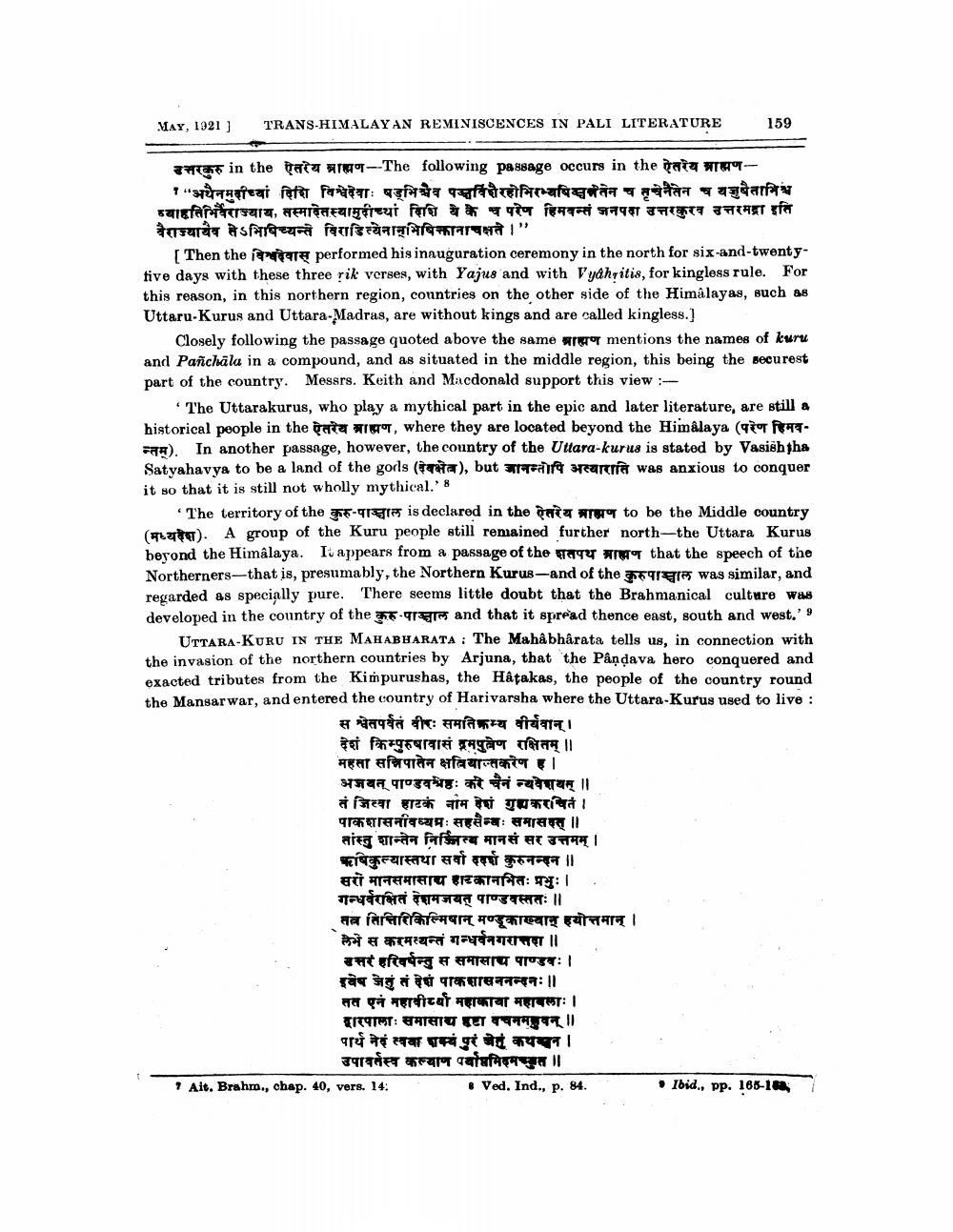________________
MAY, 1921]
TRANS-HIMALAYAN REMINISCENCES IN PALI LITERATURE
159
उत्सरकुरु in the ऐतरेय ब्राह्मण-The following passage occurs in the ऐतरेय ब्राह्मण
"अयैनमुदीध्यां दिशि विश्वेदेवाः षड्भिश्चैव पचविशेरहोभिरभ्यपिचतेन च तृचेनतेन च यजुषैतानिश्च व्याहतिभिराज्याय, तस्मादेतस्थामुदीच्या विशिये के च परेण हिमवन्सं जनपदा उत्तरकुरव उत्तरमद्रा इति वैराज्याचैव तेऽभिषिच्यन्ते विराडित्येनानभिषिक्तानाचक्षते ।"
Then the more performed his inauguration ceremony in the north for six-and-twentyfive days with these three rik verses, with Yajus and with Vyahritis, for kingless rule. For this reason, in this northern region, countries on the other side of the Himalayas, such 88 Uttaru-Kurus and Uttara-Madras, are without kings and are called kingless.]
Closely following the passage quoted above the same war mentions the names of kuru and Panchāla in a compound, and as situated in the middle region, this being the securest part of the country. Messrs. Keith and Macdonald support this view:
The Uttarakurus, who play a mythical part in the epic and later literature, are still a historical people in the ऐतरेय ब्राह्मण, where they are located beyond the Himalaya (परेण हिमवन्तम). In another passage, however, the country of the Uttara-kurus is stated by Vasishjha Satyahavya to be a land of the gorls (देवमेव), but जानन्तोपि अत्याराति was anxious to conquer it so that it is still not wholly mythical.' 8
The territory of the कुरु-पाञ्चाल is declared in the ऐतरेय प्रामण to be the Middle country मयदेशा). A group of the Kuru people still remained further north-the Uttara Kurus berond the Himalaya. I appears from a passage of the Te A t that the speech of the Northerners-that is, presumably, the Northern Kurus-andof the क़रूपाताल was similar, and regarded as specially pure. There seems little doubt that the Brahmanical culture was developed in the country of the कुरु-पाञ्चाल and that it spread thence east, south and west.19
UTTARA-KURU IN THE MAHABHARATA : The Mahabharata tells us, in connection with the invasion of the northern countries by Arjuna, that the Pandava hero conquered and exacted tributes from the Kimpurushas, the Hâtakas, the people of the country round the Mansarwar, and entered the country of Harivarsha where the Uttara-Kurus used to live :
स श्वेतपर्वतं वीरः समतिक्रम्य वीर्यवान् । देशं किम्पुरुषावासं दूमपुत्रेण रक्षितम् ।। महता सन्निपातेन क्षवियाल्तकरण हा अजबत् पाण्डवश्रेष्ठः करे चैनं न्यवेशयम् ।। तं जिस्वा हाटकं नाम देशं गुधकरचितं । पाकशासनीवव्यग्रः सहसैन्धः समासात् ॥ तांस्तु शान्तेन निमित्य मानसं सर उत्तमम् । ऋषिकुल्यास्तथा सर्वा ददर्श कुरुनन्दन ॥ सरों मानसमासाथ हारकानभितः प्रभुः। . गन्धर्वरक्षितं देशमजयत् पाण्डवस्ततः॥ तत्र तित्तिरिकिल्मिषान् मण्डूकाख्वान् हयोत्तमान । लेभे स करमत्यन्तं गन्धर्वनगरात्ता॥ सत्सर हरिवर्षन्तु स समासाथ पाण्डवः। इवेष जेतुं सं देशं पाकशासननन्दनः॥ सत एनं महावीर्यो महाकावा महाबलाः। द्वारपालाः समासाथ हटा वचनम्वन् ।। पार्थ ने स्ववा पायं पुरं अहं कथयन।
उपावर्तस्व कल्याण पर्वावमिदमच्युत ॥ * Ait. Brahm., chap. 40, vers. 14:
• Ved. Ind., p. 84. • bid., pp. 185-100




